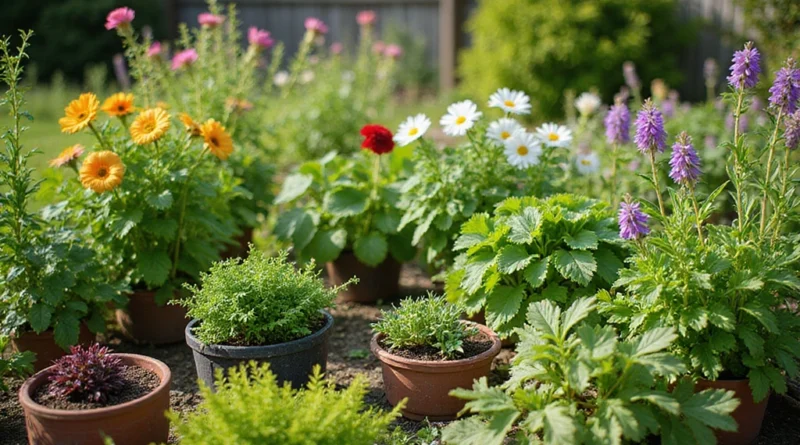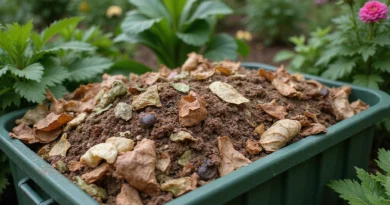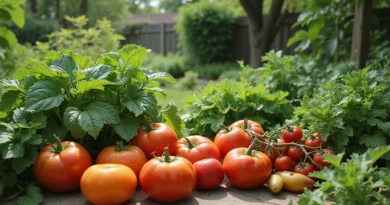Pro Tips for Easy Garden Care: How to Keep Your Plants Healthy All Year Round
Gardening can be one of life’s simplest joys, offering a sanctuary of beauty right in your backyard.
Whether you have a sprawling garden or just a few potted plants, keeping them healthy is essential.
With a few simple tips and tricks, you can ensure your plants thrive throughout the seasons, turning your garden into a vibrant oasis.
Let’s dig into some fabulous garden care tips that make maintenance easy and keep your plants looking lush and happy.
1. Choose the Right Plants for Your Space

Selecting the right plants for your garden is the first step towards success.
Consider your local climate, soil type, and available sunlight when making your choices. Native plants often thrive better and require less maintenance.
– Research local flora: Native plants are adapted to your area and are more resilient against pests and diseases.
– Consider plant height: Taller plants can shade shorter ones, so arrange them wisely.
– Mix perennials and annuals: This helps keep your garden blooming year-round.
In addition, pay attention to the mature size of your plants to avoid overcrowding. Healthy plants are about more than just pretty petals; it’s about creating a balanced ecosystem in your garden.
2. Invest in Quality Soil

Healthy soil is the foundation of a flourishing garden.
Before planting, take the time to invest in nutrient-rich soil. Quality soil retains moisture and allows roots to spread easily.
– Test your soil: Check its pH and nutrient levels to understand what amendments are needed.
– Use organic matter: Adding compost or well-rotted manure can significantly improve soil quality.
– Mulch wisely: A layer of mulch helps retain moisture and suppress weeds.
Healthy plants begin with healthy soil, so ensure you start off right for robust growth throughout the year.
3. Water Wisely

Water management is key to keeping your plants hydrated but not overwatered.
Understanding your plants’ watering needs can prevent root rot and drought stress.
– Water early or late: Early mornings are ideal, reducing evaporation.
– Deep watering: Encourage deep root growth by watering thoroughly but less frequently.
– Use drip irrigation: This method conserves water and delivers it directly to the roots.
Pay attention to the moisture levels in the soil—if it’s dry an inch down, it’s time to water. Healthy plants are all about balance, and your watering routine is crucial to that.
4. Fertilize Smartly

Fertilizing your plants properly can lead to greener foliage and more blooms.
But it’s important not to overdo it; too much fertilizer can harm your plants.
– Know your plants: Different plants have different nutrient needs—research them.
– Use organic fertilizers: They are often more sustainable and gentler on your plants.
– Follow a schedule: Regularly feeding during the growing season can support optimal health.
Keep an eye on your plants; if they’re looking dull, they might need a boost. A little extra love can go a long way in the world of garden care.
5. Pruning and Deadheading

Regular pruning and deadheading keep your plants looking tidy and help them grow better.
Removing spent blooms encourages new growth and prevents plants from wasting energy.
– Use clean tools: Always sanitize your tools to avoid disease transfer.
– Prune at the right time: Research when your plants bloom; some benefit from fall pruning while others prefer spring.
– Don’t be afraid to cut: If a branch is unhealthy, removing it can promote overall health.
Healthy plants thrive with attention, and a little trimming can keep them in top shape.
6. Pest Management with a Gentle Touch

Pests are part of gardening, but how you manage them can make all the difference.
Opt for natural pest control methods that protect your plants without harsh chemicals.
– Encourage beneficial insects: Ladybugs and lacewings can keep harmful pests in check.
– Use neem oil: This natural pesticide is effective against many garden pests.
– Handpick pests: Sometimes, a simple removal can solve the problem.
Always monitor your plants for signs of trouble, and don’t let a small pest problem turn into a full-blown invasion. Healthy plants require a proactive approach to pest management.
7. Seasonal Care Adjustments

As the seasons change, so do your garden’s needs.
Adapting your care routine is key to ongoing success throughout the year.
– In spring: Focus on planting, fertilizing, and nurturing new growth.
– In summer: Ensure proper watering and watch for pests as plants are more vulnerable.
– In fall: Prepare your garden for winter; mulch to protect roots and prune plants.
– In winter: Some plants may need extra care indoors.
By adjusting your gardening practices to match seasonal changes, you’ll support healthy plants all year long.
8. Companion Planting for Natural Harmony

Companion planting is a fun and effective way to promote healthy growth in your garden.
Certain plants thrive better when grown together, providing mutual benefits.
– Basil and tomatoes: Basil deters pests while enhancing tomato flavor.
– Carrots and onions: They work together to repel each other’s pests.
– Marigolds: These flowers attract beneficial insects and deter harmful ones.
Experiment with various combinations to find out what works for your space. Healthy plants are often the result of clever partnerships in your garden.
9. Embrace Technology for Monitoring

In this digital age, technology can aid in garden care too!
From moisture sensors to garden apps, there are tools to help keep your finger on the pulse of plant health.
– Soil moisture sensors: Know when to water with precision.
– Garden planning apps: Track plant growth and care schedules.
– Weather alerts: Stay informed about frost warnings and temperature changes.
Using technology can simplify your garden care routine, allowing for healthy plants with less guesswork.
10. Join a Gardening Community

Gardening can be a solitary activity, but it doesn’t have to be!
Connecting with fellow garden lovers can provide inspiration, tips, and support.
– Local gardening clubs: Join a group in your area for hands-on help and friendship.
– Online forums: Engage with others on platforms dedicated to gardening.
– Social media groups: Share your progress and get feedback on your plants.
A community can provide valuable knowledge and encouragement, ensuring your plants—and you—stay healthy and happy.
Conclusion

Caring for your garden doesn’t have to be overwhelming; it can be a joyous journey.
With these garden care tips, you’ll cultivate not just healthy plants, but also a deeper connection with nature.
So, gather your tools, get your hands dirty, and watch your garden flourish throughout the seasons!



